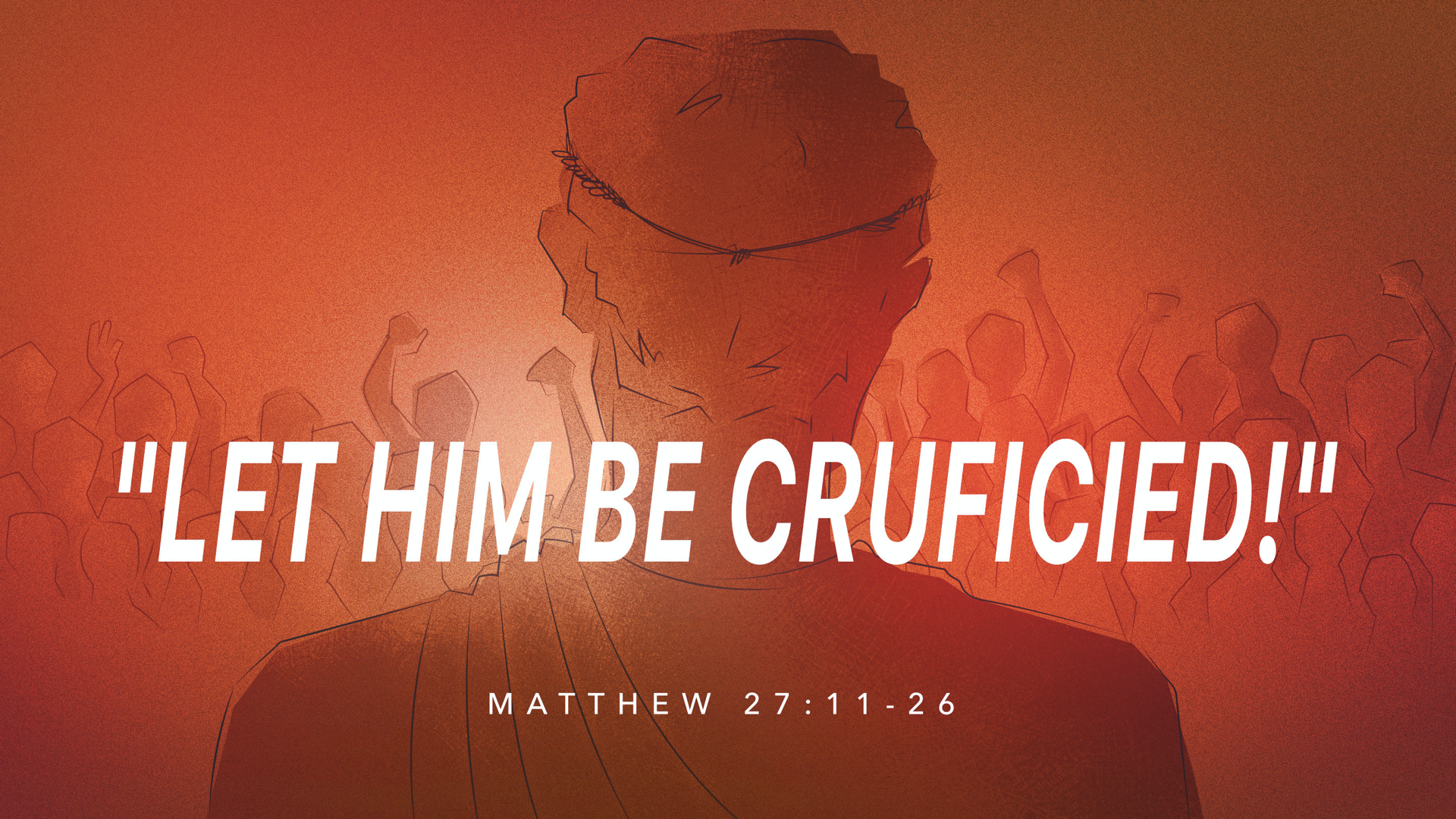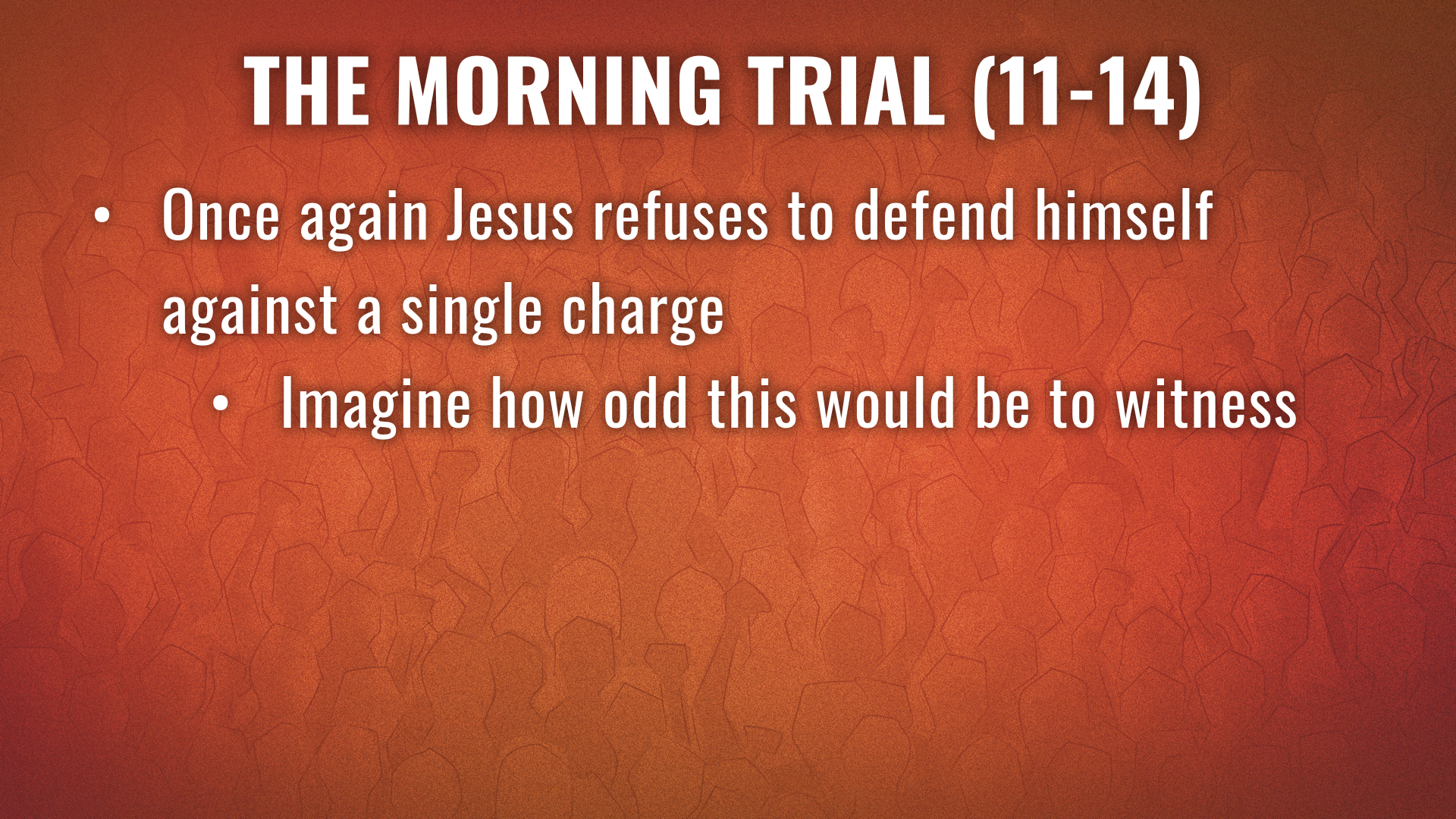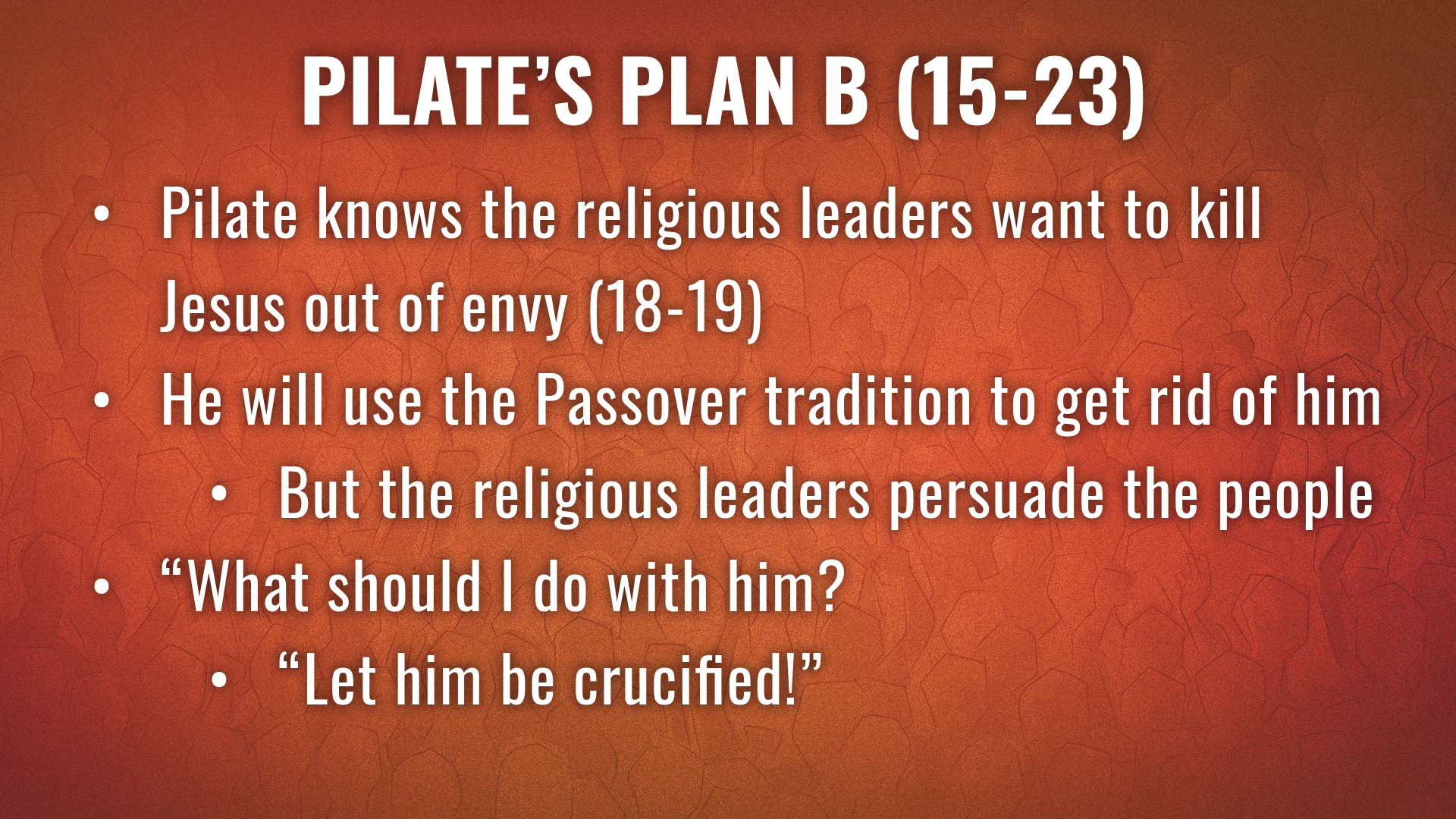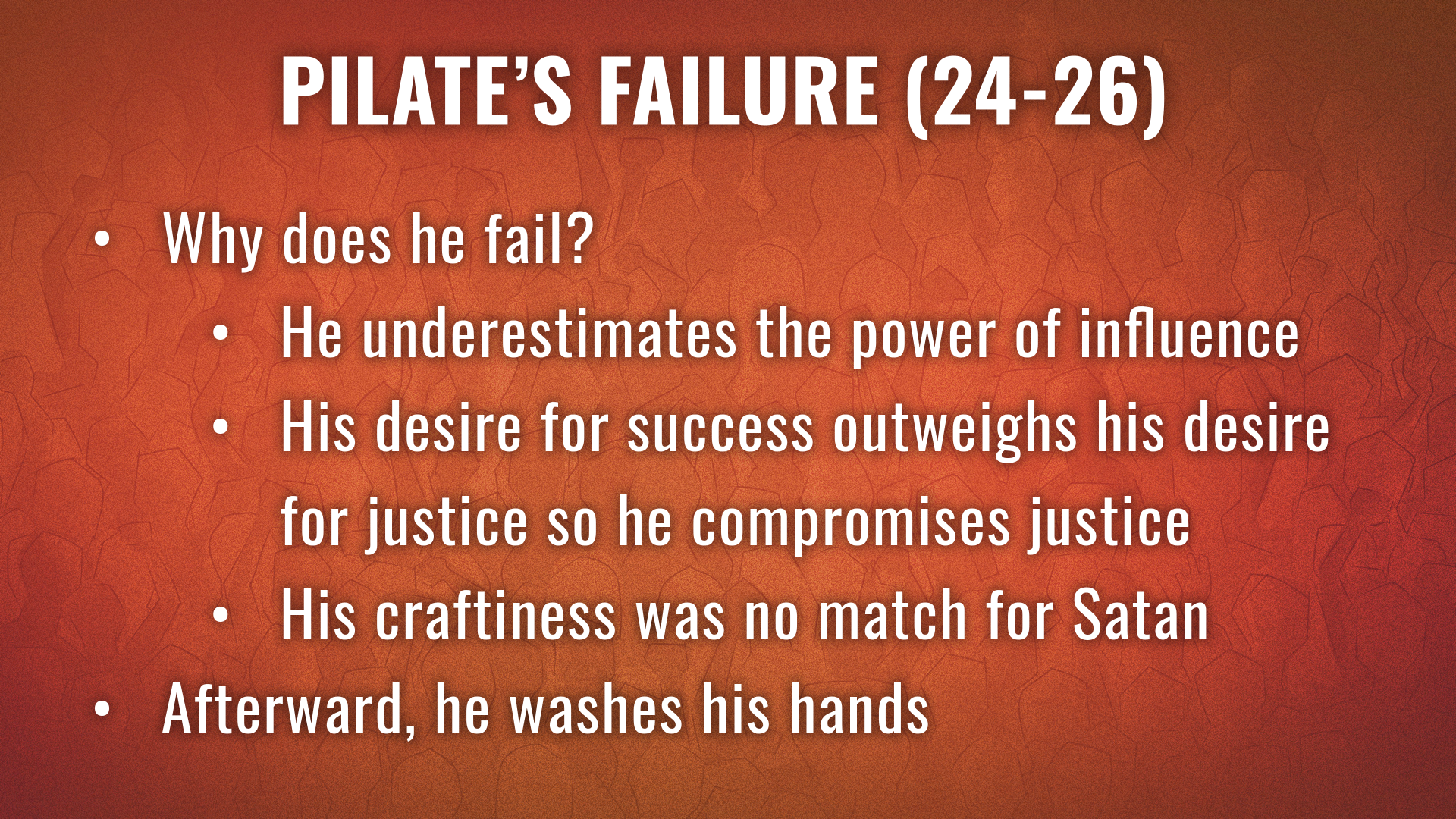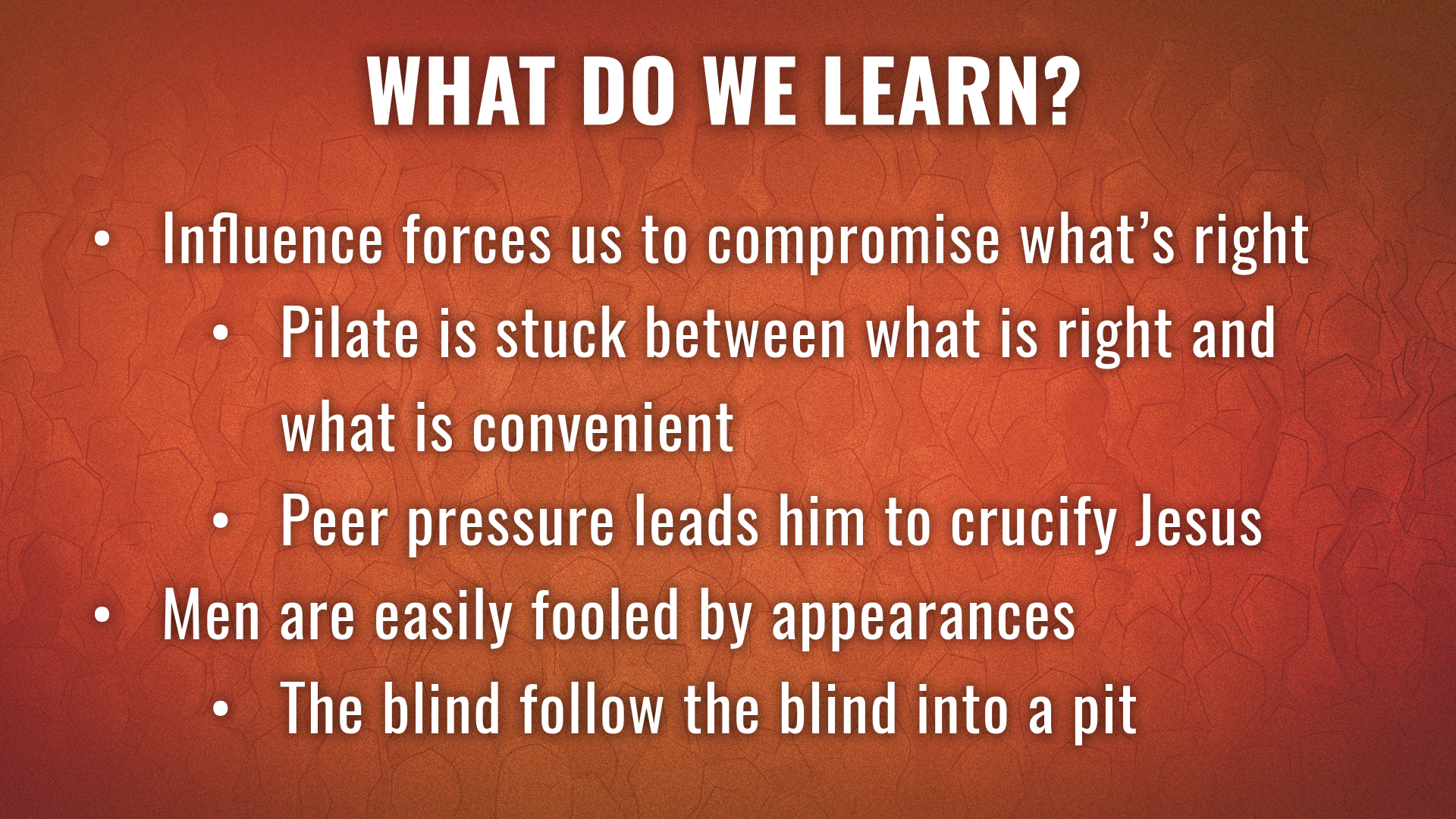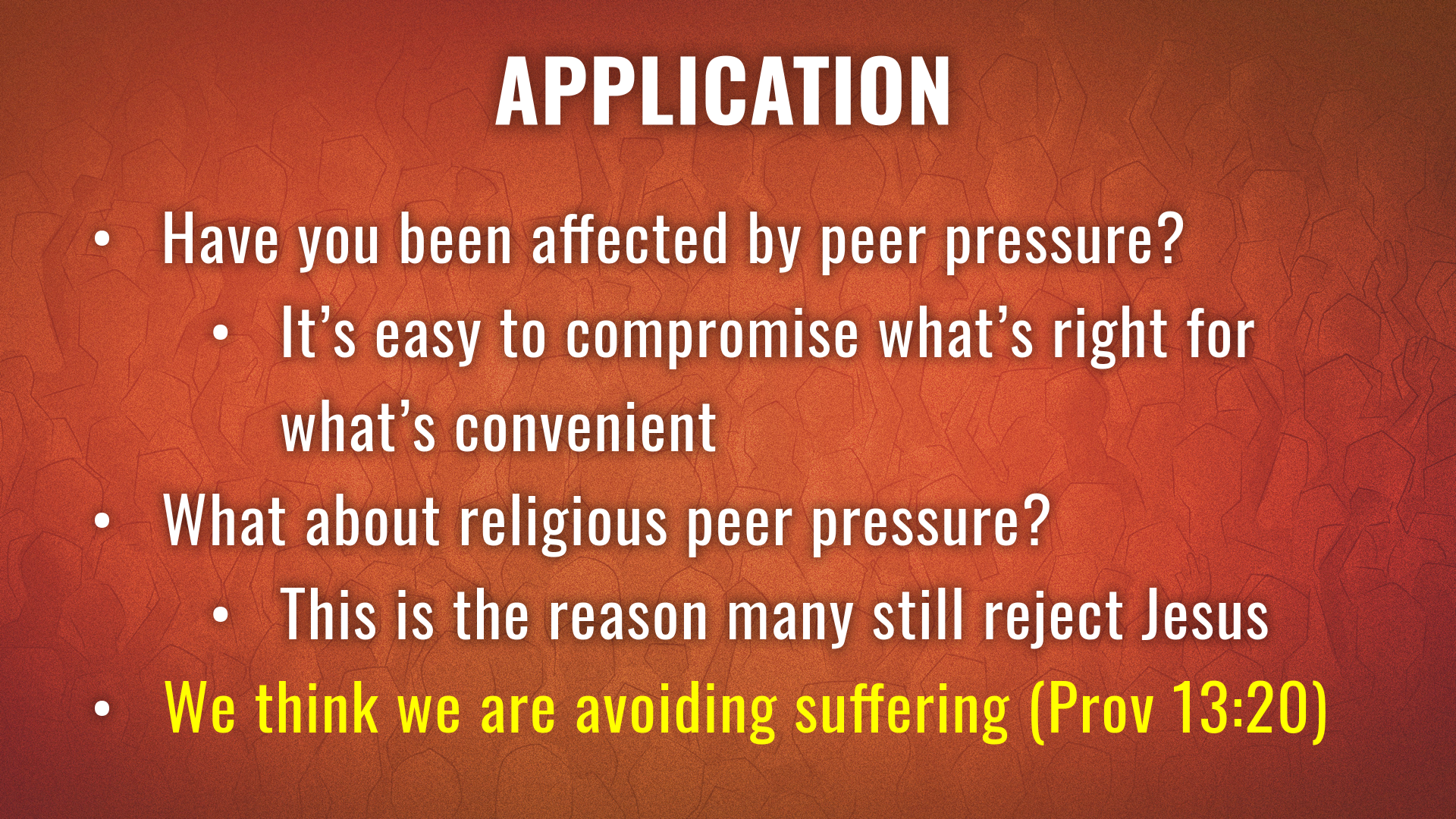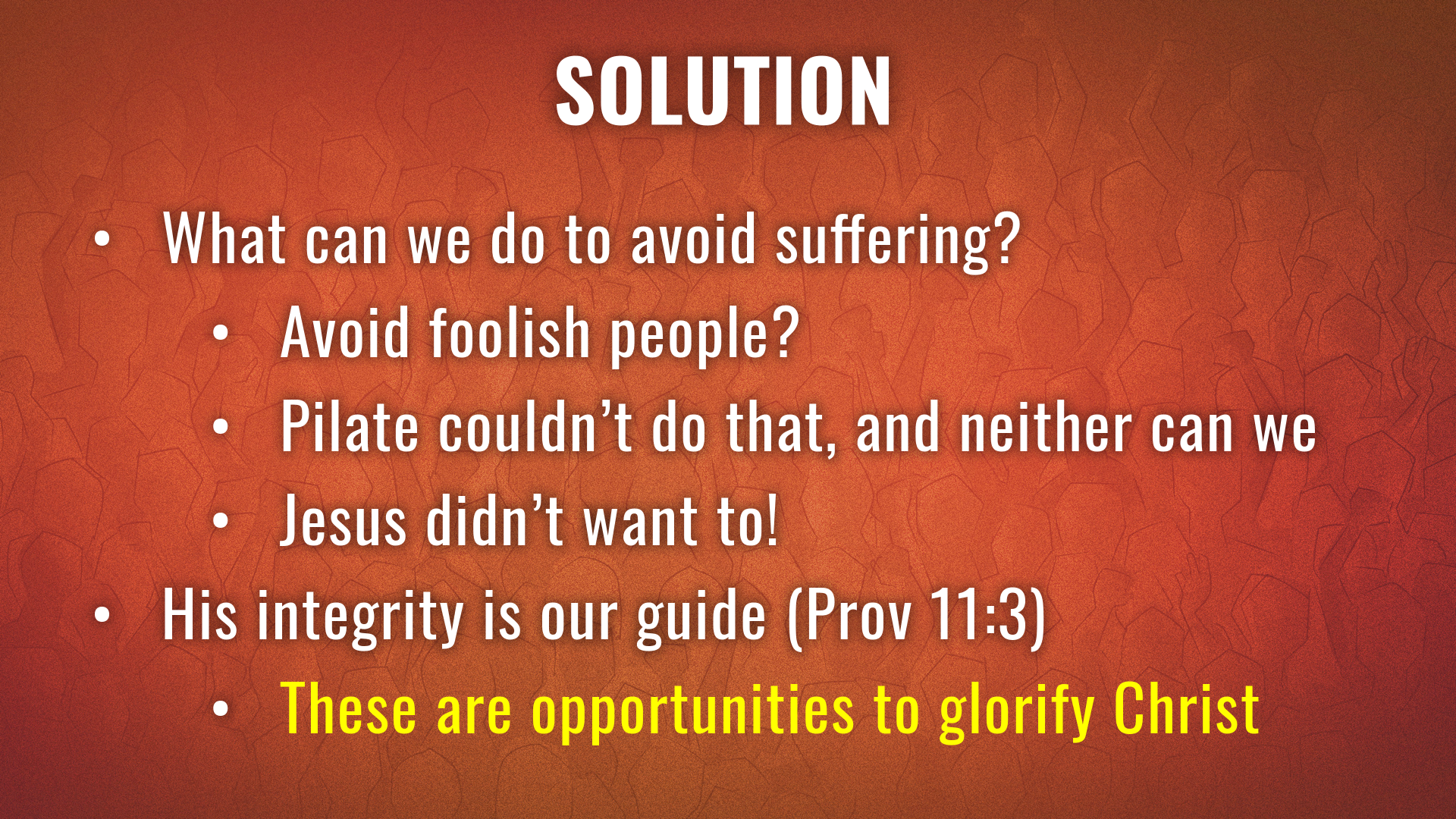"Let Him Be Crucified" (Matthew 27:11-26)
What would an adult version of that class look like today? Would it warn us about buying something we don't need because of an advertisement? Would it tell me the danger of believing what I read on the internet or propaganda on the news? People have been mastering the art of manipulation and stirring up anger or love for the last hundred years with television, computers, and cell phones. Maybe it would talk about comparing our possessions (cars, houses, etc.) to other people or comparing our jobs, spouses, and children. We need a class on that.
Today's text won't tell us everything we need to know about that, but it will discuss the downside of being easily influenced.
The Morning Trial
Jesus has been arrested. The Jews have accused him of blasphemy and condemned him to die, but they can't kill anyone because they are under Roman rule. They must take him to be tried before Pilate, the governor. Justice at last! The governor will see how ridiculous this all is and set Jesus free.
Matthew 27:11--14 (ESV) --- 11 Now Jesus stood before the governor, and the governor asked him, “Are you the King of the Jews?” Jesus said, “You have said so.” 12 But when he was accused by the chief priests and elders, he gave no answer. 13 Then Pilate said to him, “Do you not hear how many things they testify against you?” 14 But he gave him no answer, not even to a single charge, so that the governor was greatly amazed.
Jesus is standing before Pilate on the day of Passover. If Jesus wanted to go against the will of God, now is the time for him to do it. He can plead his case, speak up, and be heard in this court. Pilate has no desire to kill an innocent man. Instead, Jesus speaks only the truth when he is spoken to. He tells Pilate, "You have said so." Has Pilate said so? Does Pilate know who Jesus is? How could he not after all the commotion that Jesus has stirred up? But then, he does not defend himself against a single charge. Notice how Pilate is "greatly amazed" by this. How many trials has Pilate seen, and how often has anyone chosen not to defend themselves whether they are guilty or innocent.
Pilate Uses Plan B
After this, we see that Pilate is not convinced that Jesus deserves to die.
Matthew 27:15--23 (ESV) --- 15 Now at the feast the governor was accustomed to release for the crowd any one prisoner whom they wanted. 16 And they had then a notorious prisoner called Barabbas. 17 So when they had gathered, Pilate said to them, “Whom do you want me to release for you: Barabbas, or Jesus who is called Christ?” 18 For he knew that it was out of envy that they had delivered him up. 19 Besides, while he was sitting on the judgment seat, his wife sent word to him, “Have nothing to do with that righteous man, for I have suffered much because of him today in a dream.” 20 Now the chief priests and the elders persuaded the crowd to ask for Barabbas and destroy Jesus. 21 The governor again said to them, “Which of the two do you want me to release for you?” And they said, “Barabbas.” 22 Pilate said to them, “Then what shall I do with Jesus who is called Christ?” They all said, “Let him be crucified!” 23 And he said, “Why? What evil has he done?” But they shouted all the more, “Let him be crucified!”
Verses eight-teen and nineteen tell us what Pilate thinks of all of this. Pilate perceives that the leaders were delivering Jesus up out of envy. He knows what is going on here, but he can't make a ruling in favor of Jesus if he doesn't defend himself. Verse nineteen adds to the intrigue by telling us about his wife having a bad dream because of Jesus. Matthew lets us know that Pilate didn't want to go through with this. That's why he initiates Plan B, which is Plan C (Matthew left out Pilate sending Jesus to Herod because he was from Galilee). Plan B only works because it is Passover. On Passover, he has a tradition of freeing one prisoner. He brings Jesus and a notorious prisoner named Barabbas before the crowd at the Passover feast. He thinks, "The crowds love Jesus. They will set him free." But he underestimated the influence of the Jewish leaders. They have power and influence over the people. The religious leaders easily persuaded the crowd to ask for Barabbas, a notorious prisoner, instead of Jesus.
This is something for us to pause and think about. How could the chief priests and elders persuade the crowd like this? Pilate saw through the religious leaders' envy and malice. They didn't. So the question is, "Why didn't they?" They're even persuaded to say of Jesus, "Let him be crucified!" This is the most severe death penalty imaginable. Pilate asks, "Why? What evil has he done?" But they shouted all the more, "Let him be crucified."
Pilate's Failure
At this point, things start to get out of hand. The people are angry. They want Jesus dead. What a massive turnaround from one day earlier.
Matthew 27:24--26 (ESV) --- 24 So when Pilate saw that he was gaining nothing, but rather that a riot was beginning, he took water and washed his hands before the crowd, saying, “I am innocent of this man’s blood; see to it yourselves.” 25 And all the people answered, “His blood be on us and on our children!” 26 Then he released for them Barabbas, and having scourged Jesus, delivered him to be crucified.
Pilate's craftiness was no match for Satan. Instead of helping the situation, he caused a riot. This bizarre scene ends with Pilate trying to clean his hands, claiming that he is innocent of Jesus' blood. But it also ends with the people taking ownership of the guilt. They say, "His blood be on us and on our children."
What Do We Learn?
From this, we learn that influence leads us to compromise what we know to be morally good, and influence happens fast when something looks a certain way!
Look at how quickly Pilate loses control. Pilate thinks that he can avoid the influence of the religious leaders, but he can't. Pilate wakes up on a feast day, thinking that he will enjoy the day. But the leaders of the Jews bring a man in front of him, expecting him to kill him. Pilate doesn't want to do it. He knows it is wrong, but he wants the Jewish leaders to like him. He wants to maintain peace and order, but he is the one who should make sure that Jesus receives justice. He has a plan. Pilate will pass the buck. We see him send Jesus to Herod in other gospels because he is from Galilee and Herod is over Galilee. But he always gets sent back to Pilate. He decides to have the people judge Jesus. That only increases the pressure placed on him to do the wrong thing as the crowd is almost in a riot over Jesus, calling for crucifixion.
Look at how the crowds react. Do they think that Barabbas deserves to be set free over Jesus? What good deed has Barabbas done? Jesus has healed and helped thousands. He has revealed the evil of the religious leaders. Yet this crowd is quickly affected by the power of influence. They don't remember any of those things Jesus has done. They see him arrested and believe that he's a criminal. Or they see everyone else getting upset at him, and they decide to save their skin instead of fighting against the wave of unreasonable anger. "Who cares who Jesus is? What about me?"
Application
What prevents you from doing the right thing? Is it your beliefs, your family, or friends you work with? How many of you have joined a group of friends who are not Christians and felt the pressure to do whatever it is that they do? Maybe they are foolish with their money, they stay out too late, they are disrespectful and consider it funny, or they just don't spend any time doing spiritual things. Do they influence you? Is their opinion about you important? Does it make you do things you shouldn't do?
We are all fighting against shame avoidance inside us or failure avoidance. That desire to avoid failure or shame pushes us to do things we shouldn't do or not do things we should do.
I wonder how many of you have been affected by religious peer pressure. Do you resist when we sing for you to come forward or let someone know about your desire to obey? Why? Are you more concerned about what people think than you are about doing the right thing?
I think we have all been in this position that Pilate is in or the position of the crowd. It happens out of nowhere. The crowd we are in unexpectedly becomes focused on doing something wrong, and we are faced with a choice. Either we suffer, or we resist their influence. We try to make way for evil to be avoided, but Satan is more crafty than we are. The proverb holds.
Proverbs 13:20 (ESV) --- 20 Whoever walks with the wise becomes wise, but the companion of fools will suffer harm.
If we make friends with people who love the world, we should expect to suffer at their hands or fail to stand up for Christ.
Solution?
What should we do to avoid this suffering? Maybe your solution is to avoid all contact with foolish people. How is that going to work? Who isn't foolish? Pilate had to deal with foolish people as part of his job, so did we? Notice that Jesus doesn't avoid foolish people. If he wanted to do that, he would have stayed in heaven. Instead, we need to accept that suffering is the nature of loving people who are evil. Jesus set the example for us. He chose to suffer at the hands of evil men.
I'm not telling you to leave behind your brethren and pursue as many relationships with foolish people as you can. The point of the proverb is to encourage us to choose wise companions, and our brethren have the wisdom to share. But the point of this text is not to avoid all foolish people. That's impossible.
How are we supposed to deal with the pressure of foolish people to be foolish? One more proverb will help us.
Proverbs 11:3 (ESV) --- 3 The integrity of the upright guides them, but the crookedness of the treacherous destroys them.
We need to remember two things when dealing with foolish people around us who have the power of influence.
1. Integrity Is Our Guide
We will feel the need to compromise to maintain our friendships, relationships, appearance, etc., but Satan is more crafty than we are. We are better off letting our integrity guide us. We are better off being honest and suffering a minor loss than a significant loss. If we lose our jobs, so be it.
2. Christ Never Compromised
Remember what Christ has done for you. Jesus refused to compromise his integrity. Any hard thing that we will have to do is worth it. Suffering is an opportunity to show Christ's love to the world. Don't miss your opportunity.
Conclusion
I'm not sure what an adult peer pressure class would look like, but I'm sure of this: The solution is Christ. He is the only one who can provide the forgiveness we need for all our failures. The truth is that we have all compromised our integrity and fallen to peer pressure. But those of us who are in Christ are seeking the way of righteousness. We want to be men and women of integrity.

